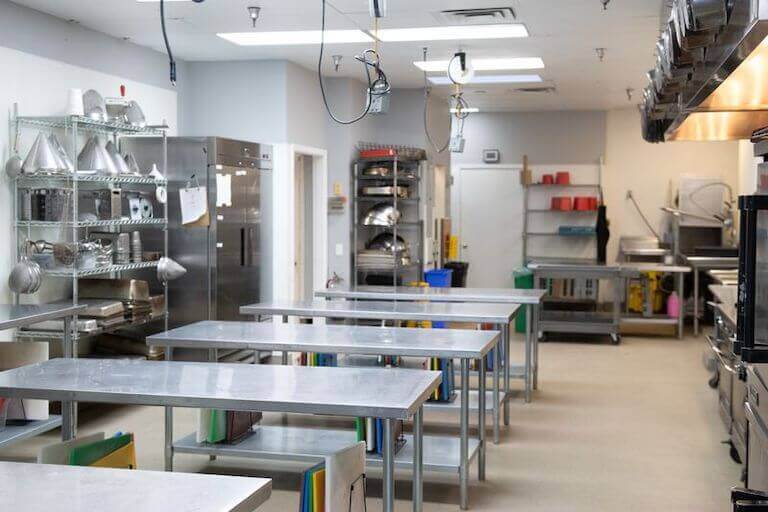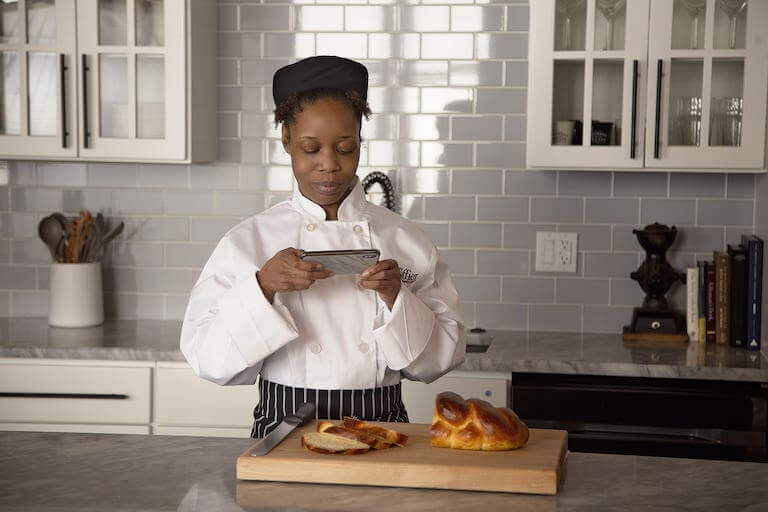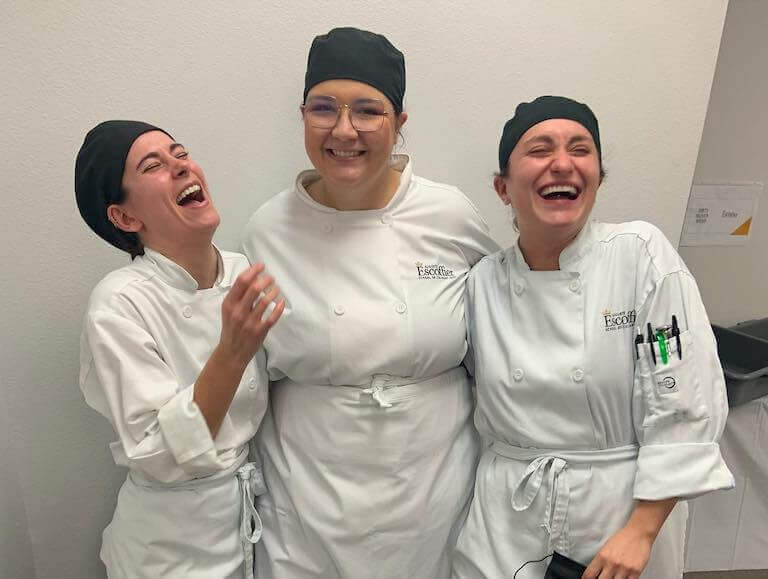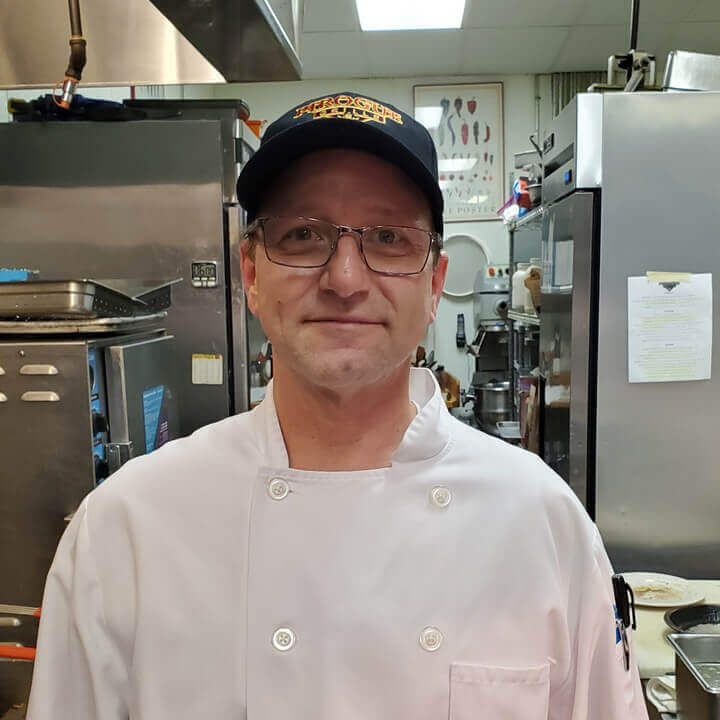Listen to This Article:
Do you dream of becoming a chef but worry about the cost of culinary school? Don’t let financial concerns stand in the way of pursuing your culinary passion. While higher education can seem like a significant investment, the value of pursuing a career you can love can far outweigh the cost.
So, instead of focusing on what it will cost you, consider all the ways it can pay off for you in the long run. Imagine a career where you can develop your creative abilities in the culinary world and do work that leaves you feeling fulfilled.
Below, we’ll explore the varying costs of culinary school and how you can make it work for you.
The Cost of Culinary Education
The cost of a culinary education can vary based on the type of program and the school you choose to attend. Auguste Escoffier School of Culinary Arts aims to keep programs accessible to more people. At the time of publication, the total cost for an associate degree in culinary arts at Escoffier is around $35,145 – $39,365. Diploma programs can cost less, coming in at around $19,569 – $23,272.† (Tuition rates may vary over time. Please refer to our tuition page for the latest data.)
† The total online program cost can encompass tuition, tool kit, uniform, and an optional non-refundable technology fee if you do not already have a computer. The cost of books is not included. Students may choose to purchase books when enrolling. Textbooks are delivered electronically for online students, for whom the cost of books used in the program and available online are included in the tuition cost.
For more cost details, refer to our catalog.
Compared to a private four-year college or other culinary arts programs, Escoffier offers a moderate and competitive pricing structure, which could make it a smart investment for a future in the culinary arts.
*Information may not reflect every student’s experience. Results and outcomes may be based on several factors, such as geographical region or previous experience.

Escoffier’s Boulder campus kitchen
Additional Costs of Culinary School Supplies
While there are additional costs for supplies and equipment, these are often less significant than anticipated. Students typically need uniforms, knives, and textbooks, but many schools, including Escoffier, may provide some of these or offer them at a discounted rate. Toolkits and other supplies may also change from year to year.
How Can You Afford Culinary School?
If you think the only people who can afford to go to culinary school come from wealthy backgrounds, think again. Most students at Escoffier rely on financial aid like student loans, scholarships, or grants to finance their education.**
**95% of Austin students and 59% of Boulder students who entered postsecondary education for the first time received some financial assistance in 2022-23 for those who applied and qualified.
**College Navigator, National Center for Education Statistics
Student Loans
The most common type of financial aid is the student loan. Some loans come from private institutions, like loan agencies or banks. Others come from the federal government. Federal student loans usually have lower interest rates than private loans, which can make them the best place to start when looking to borrow. Students repay these loans when they complete their education and enter the workforce.
Because Escoffier is an accredited educational institution that is also approved to participate in U.S. Title IV Financial Aid programs. Therefore, students who apply and qualify may be able to finance at least part of their education with federal student loans.
Culinary Scholarships & Grants
While student loans need to be repaid, scholarships and grants do not. Many national, regional, and local institutions offer scholarships to culinary school students. We encourage you to apply for as many as you can since scholarships and grants are normally not re-paid. Here are a few financial aid resources and options to explore:
- Scholarships directly from your school (For example, The Escoffier Scholarship Foundation, for example, offers need-based scholarships.)
- The National Restaurant Association Education Foundation
- American Culinary Federation
- James Beard Foundation
- Les Dames d’Escoffier (international and local chapters)
- Research Chefs Association
- Local Business & Industry Groups
Some of these awards will be limited to high school students, while others may be reserved for those with interests in specific segments of the culinary arts. Some scholarships may be limited to those in certain life circumstances, like single parents or LGBTQ+ students. Cast a wide net when hunting for scholarships. You can even continue to apply after you’ve begun your coursework.
Escoffier graduate and James Beard Scholarship winner Wyl Lima shares his story*
*Information may not reflect every student’s experience. Results and outcomes may be based on several factors, such as geographical region or previous experience.
Veteran & Military Benefits
Active duty military, veterans, and their families may qualify for some government funding. As a 2023-2024 Military Friendly® school, Escoffier is committed to helping military and veterans with student support.
The Department of Veterans Affairs and the Department of Defense are the determining bodies of benefit eligibility. More information about education benefits offered by the VA is available on the official U.S. government website. For more information on Active Duty Benefits, please visit an Education Office on base.
GI Bill® is a registered trademark of the U.S. Department of Veterans Affairs (VA).
Three Common Misconceptions About the Cost of Culinary School
Aside from the financial costs of culinary school, you may be wondering about the other ways attending school will “cost” you. From lost income to missed opportunities, there are a few common misconceptions about ways taking time to attend school may impact your life and career. However, you may be surprised to discover that these “costs” are not as high as you may think. Below, we address these misconceptions and the truth you should know instead.
1. Culinary School Will Cost Me Years
At some schools, an associate degree program can take two full years to complete. But Escoffier’s culinary arts degrees can be finished in just 60 to 84 weeks, depending on various factors, including whether students study on campus or online. This shorter timeframe might make the overall “time cost” more affordable.
Many students are surprised at how much is packed into the short time frame of our intensive, focused program. As Culinary Arts graduate Brent Unruh says, “If you want to learn, you should go to culinary school. You’ll be exposed to a lot more in a very short period of time. You could spend ten years working in restaurants and not get the experience that you’re going to get working with pastries with Chef Suzanne, for instance.”*
*Information may not reflect every student’s experience. Results and outcomes may be based on several factors, such as geographical region or previous experience.
2. Culinary School Can Have Major Costs in Lost Earnings
Another common concern is the loss of income that will occur while you attend culinary school. After all, some culinary programs demand that you be on campus for up to eight hours per day, making it difficult to earn a living while you study.
However, Escoffier’s online programs offer flexibility that allows many students to work part-time or full-time while they attend school. Students can complete their education from their home kitchens without the need for commuting or adhering to a strict class schedule as long as they meet program deadlines and participate in an industry externship. This flexibility often means that students incur little to no “cost” in lost earnings. In fact, Escoffier was named one of America’s Top Online Learning Schools for 2025 by Newsweek.

Escoffier online students may create enticing foods in their own kitchens!
3. Culinary School Will Cost Me Real-World Networking Opportunities
You may worry that you’ll miss out on important opportunities to make connections within the industry if you’re spending time in class. However, many students find culinary school to be an invaluable source of industry contacts. Fellow students and Chef Instructors can become mentors, offering career advice and sharing their own experiences.
This network may even be a source of future employment. When chefs need to hire someone new, they often think of their professional network before posting a job opening online. So, connecting with your fellow students and other alumni can be a smart career move in the long term.
*Information may not reflect every student’s experience. Results and outcomes may be based on several factors, such as geographical region or previous experience.
By attending culinary school, you not only can gain skills and knowledge but can also to build a network that can support your career growth and open doors to new opportunities.

Culinary school can help students build a network with others in the culinary industry.
An Education Is an Expense, But It’s Also an Investment
When planning your next steps, it’s easy to get caught up in the dollar cost of education. Every student must decide for themselves which programs make sense for their financial situation. However, rather than seeing culinary school as an expense, consider it an investment in your future. Smart investments yield a good return, and the same can be true of your culinary education. This return may come in the form of greater earning potential, qualifications for better jobs, or quicker promotions throughout your career.
By investing in your education, you can open up a wider world of employment opportunities. As graduate Wyl Lima says, “You have to be willing to invest in yourself.”* It can prove that you are committed to the culinary arts as a career, not just a job. And that commitment can be a big draw for potential employers.
*Information may not reflect every student’s experience. Results and outcomes may be based on several factors, such as geographical region or previous experience.
Invest in Your Culinary Future
So, is culinary school expensive? That depends on your point of view. As an investment in your future, higher education can be a smart career move. While there are costs in both time and money, the benefits of skills, mentorship, and networking can make that investment worthwhile.
Consider the alternative “costs” of not pursuing your passion for cooking professionally. You could spend years working in a potentially limiting job while missing out on the chance to develop your skills and achieve career goals.
Ultimately, the value of a culinary education lies in the doors it can open and the professional growth it can foster. To learn more about how this investment can shape your future—contact our admissions department.
TO READ MORE ABOUT THE COSTS OF CULINARY EDUCATION, TRY THESE ARTICLES NEXT:
- How Long Does it Take to Pay Back Student Loan Debt…And Is It Worth It?
- Can You Deduct College Tuition From Taxes?
- FAFSA® for Culinary School: A Step-By-Step Guide
This article was originally published on May 23, 2022 and has since been updated.



